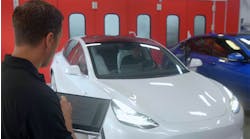Dec. 13, 2011—The Automotive Recyclers Association (ARA) is urging the collision repair industry to ensure that any official, industry-sanctioned repair standards should include all recognized procedures—not just those of the original equipment manufacturers (OEMs), according to a statement issued by the organization Tuesday.
The ARA's efforts are a response to the joint statement recently signed by several collision industry organizations, which declared published OEM repair procedures to be the collision industry’s standards.
This action could have serious negative consequences for collision repair professionals and consumers, according to the ARA. Tying the hands of body shops in this manner, the organization said, could make facilities susceptible to lawsuits in situations when repairs are not conducted strictly according to OEM standards.
The ARA said there is no such thing as a standard accident, so collision repairers must be allowed to use their professional training and judgment to make repair decisions based on the individual circumstances surrounding damaged vehicles. Repairers should not be forced to adopt a single solution and approach, the organization said.
In addition, the ARA cautioned that adhering to narrowly defined OEM standards often results in increased repair costs, which causes more vehicles to be declared as total losses. Thousands of small, independent collision repair shops will have a disadvantage trying to compete with dealer networks of certified collision repair centers, according to the ARA.
This is the second position statement issued by the ARA this month against the adoption of OEM-based repair standards. The first statement, which the ARA release_notesd Dec. 1, focused on the organization’s concern that OEM’s do not support the use of recycled parts.
The ARA said auto manufacturers have recently become more aggressive with making claims that genuine recycled parts are inferior to new OEM parts, and are attempting to exclude genuine recycled parts from the collision repair market. This would result in only one source to acquire the parts and procedures necessary to repair vehicles, according to the ARA.
Genuine recycled parts have been widely accepted for decades, and there is a long track record of their successful use, the ARA said. Genuine recycled parts are fully functional OEM parts, and in most cases are identical to the new OEM parts auto manufacturers recommend for repairs. Genuine recycled parts are typically 30-70 percent less expensive than comparable new parts, and are better for the environment since no additional energy or resources are used to create them.
"ARA believes that the goal of the manufacturers is to discourage the use of genuine recycled parts and to secure a market that establishes themselves as the only source of parts and procedures for the repair of consumers’ vehicles,” said Michael Wilson, CEO of the ARA. “If the car companies have their way and eliminate genuine recycled parts from the repair process, then the costs of those new OEM parts will undoubtedly rise.”



